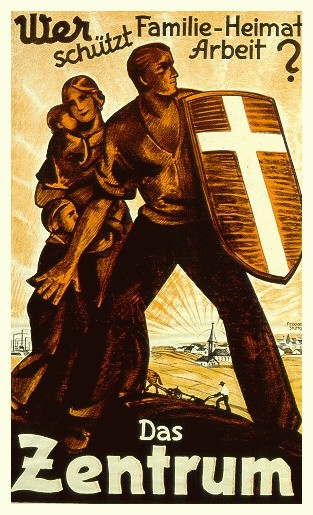The Centre Party (Zentrumspartei or Zentrum) was the political voice of Germany’s Catholics. It was formed in 1870, a time when Catholics made up a little over one-third of the empire; the remainder of Germans were Lutheran or other Protestant denominations. The young party would face considerable challenges in its first years. In 1871 Bismarck, who was himself Protestant, launched his Kulturkampf (or ‘culture struggle’) – a campaign to reduce or eliminate Catholic influence in the newly unified Germany. Bismarck’s persecution of German Catholics drove many of them toward the Centre Party; both its membership and voter numbers doubled through the mid-1870s. By 1880 the Centre Party was the second largest party in the Reichstag.
After Bismarck’s departure, the Centre Party reconciled with and generally supported the imperial government. In terms of public policy, the party sought to protect the rights of German Catholics and the Landtags (state assemblies). Other than that, it had few fixed policies or ideological positions. Like the SPD, the Centre Party was a large party that housed a large range of views. Among its membership were Christian liberal-democrats on the left, moderate conservatives in the middle and strong nationalists on the right. The party threw its weight behind the imperial government during World War I – but it also contained anti-war elements. By 1917 the Centre Party’s left wing, led by Matthias Erzberger, was voicing strong criticisms of the war and demanding a resolution for peace.
Eda Sagarra, historian
The Centre Party remained a significant political force in the post-war Republic. It won 91 seats in the first national assembly (January 1919), making it the second largest parliamentary party after the SPD. The Centre Party’s share of the vote slumped in 1920, however its representation in the Reichstag remained consistent during the Weimar period, never slipping below 62 seats. Matthias Erzberger, the Centre Party’s leader until his murder in 1921, promised the party would remain loyal to the constitution and prepared to work in coalition governments with the SPD and other parties. The Centre Party held the middle ground in the Reichstag for the duration of the republic. It had ministers in every cabinet, while the chancellorship was given to five different Centre Party members (Constantin Fehrenbach, Joseph Wirth, Wilhelm Marx, Heinrich Bruning and Franz von Papen).

1. The Centre Party was formed in 1870 to provide political representation for Germany’s Catholic population.
2. Bismarck’s Kulturkampf campaign of the 1870s drove German Catholics to the party, expanding its membership.
3. With a sizeable membership, the Centre Party contained a wide variety of ideological and policy positions.
4. It supported the war effort in 1914-18, though this created divisions and differences of opinion within the party.
5. The Centre Party was an important political player in the Weimar era, belong to all Reichstag coalitions, supplying five chancellors and boasting ministers in every cabinet.
© Alpha History 2018. Content on this page may not be republished or distributed without permission. For more information please refer to our Terms of Use.
This page was written by Jennifer Llewellyn, Jim Southey and Steve Thompson. To reference this page, use the following citation:
J. Llewellyn et al, “The Centre Party”, Alpha History, 2018, accessed [today’s date], http://alphahistory.com/weimarrepublic/centre-party/.

